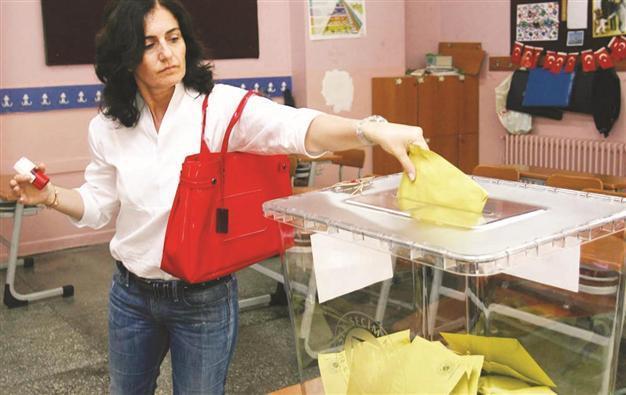Post-election scenarios for parties
ANKARA - Hürriyet Daily News

Four political parties represented in the Turkish Parliamant have begun making calculations and creating post-election scenarios. DHA photo
The March 2014 local elections hold historical significance for four political parties represented in the Parliament as it may bring about both the presidential elections five months later and the general elections scheduled for 2015 – if the date won’t be moved to an earlier one.The vote percentages may yield results that could lead to the leaders of the four parties losing their seats; hence, the leaders are nominating the strongest candidates, bearing in mind of such a phenomenon and aiming to gain the best results in the first round of the three important elections.
The Justice and Development Party (AKP) is mulling maintaining the 50 percent threshold and guaranteeing the two-round Çankaya elections five months ahead. The AKP sources are taking Prime Minister Recep Tayyip Erdoğan’s presidential candidacy and his election as almost granted.
It is known that Erdoğan doesn’t want to take the presidential seat with the President’s authoritative capacity as it currently is. It is estimated that he will knock on the Republican People’s Party (CHP)’s door one more time right after the elections and push for the “party member President” model by making a Constitution package move.
If he can’t succeed with that, he may become the President and leave his prime ministry seat to Abdullah Gül by moving the general elections to autumn of 2014. The ongoing rift with Islamic scholar Fethullah Gülen’s ”Hizmet” (service) movement and post-election context hinder Erdoğan in taking the steps to exclude Gül. A possible drop of party’s votes in local elections, the potential union of opposition parties over single names may make Erdoğan’s presidency more difficult.
Post-election scenarios that the CHP have created also revolve around a possible leader change as Kemal Kılıçdaroğlu has completed three years a chairman, having already been through an election. As this will be a crucial election for him, the party’s local election performance will be monitored very closely. The nationalist and other wings in the party may question his leadership if the results lag behind the number of municipalities won by the CHP in 2009 under the helm of the former party chairman, with 25.9 percent of votes collected in the 2011 general elections. Someone young and dynamic may be put up against him.
Again considering the mood of that day, this probing may be postponed to after presidential elections. Mustafa Sarıgül, who will run for the Istanbul mayoralty in upcoming elections, may become a potential rival if his votes exceed 37 percent of what Kılıçdaroğlu secured while running for the same seat.
The Nationalist Movement Party (MHP) is expected to go through same process in the case of an unsuccessful election performance. As Koray Aydın, who had lost against the Chairman Devlet Bahçeli in latest congress, will turn the questioning into a leadership fight. Bahçeli also may nominate the MHP’s founder-cum-former leader Alparslan Türkeş’s son, MHP Deputy Chairman Tuğrul Türkeş for his seat.
The Peace and Democracy Party (BDP) will go through a leadership change on the ground as the party’s internal regulations ban leaders from assuming the chairmanship for a third term. One of the co-leaders, Gülten Kışanak will run for Diyarbakır’s mayoral seat and probably be elected. Selahattin Demirtaş, who will soon be turning 40, the minimum age limit required to run for president, is among the strongest candidates in the Çankaya competition. The Kurdish movement will run with the People’s Democratic Party (HDP) in western provinces and the success of this party will decide if the BDP will join the HDP. Pervin Buldan and Sırrı Süreyya Önder are among the closest names in the co-chairmanships.
Will ‘democracy package’ change?
It is being said that the resolution process has been postponed until the election-end but there are different expectations on the BDP front. In Parliament, the AKP will be pushing for the passage of the democracy package in January.
If the Kurdistan Communities Union (KCK) case prisoners’ release will be secured with a motion to be issued during the package’s discussion at the commission, the outlawed Kurdistan Workers’ Party (PKK) may re-start the withdrawal it halted.
However, the AKP worries that such a move would have a negative impact on western
electorates.
Opposition set to bar budget talks
The AKP group is struggling to maintain the Parliament’s General Assembly meetings operating. The opposition asks for the taking of the registry often and seeks the policing of required numbers at Parliamentary meetings for the general assembly sessions to be valid.
As the AKP can’t secure 184 numbers of participants, the General Assembly ends up closing earlier than otherwise desired by some.
The opposition is clearing the deck for blocking the Education Ministry budget talks, aiming to benefit from ongoing tension between the Gülen movement and the AKP.
Deputies with close links to the Cemaat are expected at least to not attend General Assembly sessions during the budget talks. The AKP has taken action to quash these plans and ordered all deputies to attend budgetary meetings without any absence.











